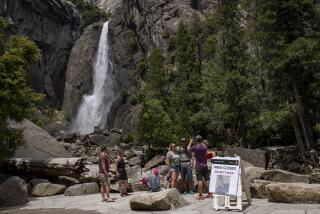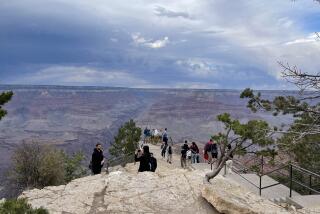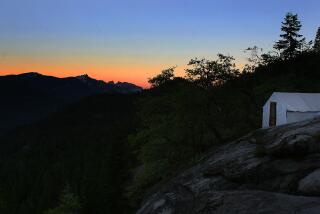Shutdown is tripping up vacationers headed to national parks
- Share via
Washington’s fiscal deadlock has closed the country’s national parks for a third day in a row, forcing travel and tourism officials to find other ways to entertain frustrated vacationers.
Visitors turned away from Yosemite National Park, for example, are being directed by local tourism officials to the Gold Rush-era town at Bodie State Historic Park, about 70 miles away. They’re also being urged to try the zip lines, horseback adventures and hiking trails near the Merced River.
Travel industry officials can’t yet document the effect of the partial federal shutdown on the nation’s $597-billion tourism industry. But the National Park Service is losing an estimated $32 million a day in entrance fees and other revenue.
“We are really trying to convince visitors not to turn around and go home,” said Julie Hadzega, a spokeswoman for the Yosemite-Mariposa County Tourism Bureau. She had just finished pitching alternative adventures Thursday to a group of French tourists. “There’s a lot of stuff to do here.”
The damage to the nation’s tourism industry could grow as word about the U.S. shutdown spreads among potential international visitors, tourism officials say.
And there are no indications that Democrats and Republicans are close to reaching a deal. This is the first time the government has shut down since a 21-day closure beginning in December 1995.
“The longer this goes on, the more people will question whether they should take those trips,” said Patricia Rojas-Ungar, a vice president at the U.S. Travel Assn., the tourism industry’s trade group. “People have a lot of choices.”
So far, vacationers seem to be taking the disruption in stride.
Jessie Amadio, a visual effects artist from Los Angeles, was planning a four-day trip to Yosemite with a friend from Philadelphia this week. Instead of canceling the retreat, she said they were considering visiting a state park in the area or perhaps look for campsites near Mammoth Lakes in Mono County.
Amadio said she worries she might have trouble making campsite reservations but she will take her chances. “We are just going to wing it,” she said.
Meanwhile, tour operators and park rangers are trying to make the best of the closures.
At an Anaheim tour company, employees are switching out bus tours to national parks with white-water rafting adventures, airplane rides and museum visits.
For example, guests who were scheduled to visit the Grand Canyon with Trafalgar Tours will instead go to a drive-through animal park in Williams, Ariz., board a plane to see the Grand Canyon from the air and take a bus to Lake Powell, about 80 miles away.
“Things have been moving by the minute today,” said Jamie Espinosa, a spokeswoman at Trafalgar Tours, which offers guided tours at more than 200 destinations worldwide.
Gettysburg National Military Park in Pennsylvania, which draws about 3 million visitors a year, is closed. But on Thursday a nearby theater run by Gettysburg College began showing a high-definition documentary about the battlefield to entertain tourists who are wandering through the town.
“It’s going to be the second-best experience you can get at Gettysburg without being on the battlefield,” said Jeffrey Gabel, executive director of the Majestic Theater.
Still, the effect of the shutdown on the travel industry has been limited because most essential federal airport workers such as screeners from the Transportation Security Administration and agents from U.S. Customs and Border Protection remain on duty.
“At this point, we do not expect airline operations to be impacted,” said Jean Medina, a spokeswoman for Airlines for America, the trade group for the nation’s airlines.
More to Read
Inside the business of entertainment
The Wide Shot brings you news, analysis and insights on everything from streaming wars to production — and what it all means for the future.
You may occasionally receive promotional content from the Los Angeles Times.










